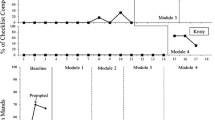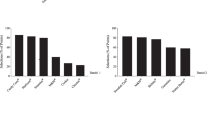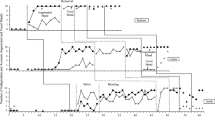Abstract
The development of a vocal mand repertoire is often delayed or deficient in children with an autism spectrum disorder. Utilizing caregivers as behavior change agents to address this core deficit may be advantageous as more learning opportunities can be incorporated in daily routines. A plethora of literature exists on teaching caregivers to promote communication with their children; however, many of these studies use behavioral skills training that can be resource-intensive. This study evaluated the effectiveness of video modeling with voice-over and on-screen text, without researcher mediation, as an alternative to behavioral skills training for teaching caregivers to teach vocal mands to their 2- to 5-year-old children with an autism spectrum disorder. The video model described mand training with an echoic prompt (Greer & Ross, 2008; Kodak & Clements, 2009), using a mnemonic (POWER: Play, Offer, Wait, Encourage, and Reinforce). Results of our nonconcurrent multiple baseline design across three dyads indicates that video modeling was effective in increasing all three caregivers’ mand training fidelity, and this correlated to small increases in independent mands with some of the child participants when training occurred less than 1 hr per week. We discuss implications for practice and areas for future research.


Similar content being viewed by others
Data Availability
Raw data may be obtained by contacting the corresponding author.
Change history
23 July 2021
This article was updated to correct Katie Wolfe’s name in the author listing.
30 July 2021
A Correction to this paper has been published: https://doi.org/10.1007/s40617-021-00637-w
References
Albert, K. M., Carbone, V. J., Murray, D. D., Hagerty, M., & Sweeney-Kerwin, E. J. (2012). Increasing the mand repertoire of children with autism through use of an interrupted chain procedure. Behavior Analysis in Practice, 5(2), 65–76. https://doi.org/10.1007/BF03391825.
American Psychiatric Association. (2015). The diagnostic and statistical manual of mental disorders (5th ed.). Washington, DC: Author.
Virués-Ortega, J. (2010). Applied behavior analytic intervention for autism in early childhood: Meta-analysis, meta-regression and dose–response meta-analysis of multiple outcomes. Clinical Psychology Review, 30(4), 387–399. https://doi.org/10.1016/j.cpr.2010.01.008
Ayres, K. M., & Langone, J. (2005). Intervention and instruction with video for students with autism: A review of the literature. Education & Training in Developmental Disabilities, 40(2), 183–196.
Barton, E. E., & Fettig, A. (2013). Parent-implemented interventions for young children with disabilities: A review of fidelity features. Journal of Early Intervention, 35(2), 194–219. https://doi.org/10.1177/1053815113504625.
Bourret, J., Vollmer, T. R., & Rapp, J. T. (2004). Evaluation of a vocal mand assessment and vocal mand training procedures. Journal of Applied Behavior Analysis, 37(2), 129–144. https://doi.org/10.1901/jaba.2004.37-129.
Brock, M. E., Seaman, R. L., & Gatsch, A. L. (2018). Efficacy of video modeling and brief coaching on teacher implementation of an evidence-based practice for students with severe disabilities. Journal of Special Education Technology, 33(4), 259–269. https://doi.org/10.1177/0162643418770639.
Carr, J. E. (2005). Recommendations for reporting multiple-baseline designs across participants. Behavioral Interventions, 20, 219–224. https://doi.org/10.1002/bin.191.
Carr, E. G., & Durand, V. M. (1985). Reducing behavior problems through functional communication training. Journal of Applied Behavior Analysis, 18(2), 111–126. https://doi.org/10.1901/jaba.1985.18-111.
Coon, J. C., & Rapp, J. T. (2018). Application of multiple baseline designs in behavior analytic research: Evidence for the influence of new guidelines. Behavioral Interventions, 33, 160–172. https://doi.org/10.1002/bin.1510.
Wainer, A. L., & Ingersoll, B. R. (2013). Disseminating asd interventions: A pilot study of a distance learning program for parents and professionals. Journal of Autism & Developmental Disorders, 43(1), 11–24. https://doi.org/10.1007/s10803-012-1538-4.
Charlop-Christy, M. H., Carpenter, M., Le, L., LeBlanc, L. A., & Kellet, K. (2002). Using the picture exchange communication system (PECS) with children with autism: Assessment of PECS acquisition, speech, social-communicative behavior, and problem behavior. Journal of Applied Behavior Analysis, 35(3), 213–231. https://doi.org/10.1901/jaba.2002.35-213.
DeLeon, I. G., & Iwata, B. A. (1996). Evaluation of a multiple-stimulus presentation format for assessing reinforcer preferences. Journal of Applied Behavior Analysis, 29, 519–532.
DiGennaro-Reed, F. D., Codding, R., Catania, C. N., & Maguire, H. (2010). Effects of video modeling on treatment integrity of behavioral interventions. Journal of Applied Behavior Analysis, 43(2), 291–295. https://doi.org/10.1901/jaba.2010.43-291.
Douglas, S. N., Kammes, R., & Nordquist, E. (2018). Online communication training for parents of children with autism spectrum disorder. Communication Disorders Quarterly, 39(3), 415–425.
Drasgow, E., Halle, J. W., Ostrosky, M. M., & Harbers, H. M. (1996). Using behavioral indication and functional communication training to establish an initial sign repertoire with a young child with severe disabilities. Topics in Early Childhood Special Education, 16(4), 500–521. https://doi.org/10.1177/027112149601600408.
Drasgow, E., Martin, C. A., Chezan, L. C., Wolfe, K., & Halle, J. W. (2016). Mand training: An examination of response-class structure in three children with autism and severe language delays. Behavior Modification, 40(3), 347–376. https://doi.org/10.1177/0145445515613582.
Drash, P. W., High, R. L., & Tudor, R. M. (1999). Using mand training to establish an echoic repertoire in young children with autism. Analysis of Verbal Behavior, 16, 29–44.
Du, L., Nuzzolo, R., & Alonso-Álvarez, B. (2016). Potential benefits of video training on fidelity of staff protocol implementation. Behavioral Development Bulletin, 21(1), 110–121. https://doi.org/10.1037/bdb0000019.
Esch, B. E. (2008). The Early Echoic Skills Assessment. In Sundberg, M.L. (Ed.), Verbal behavior milestones assessment and placement program: The VB-MAPP. (p. 24) Concord, CA: AVB Press.
Erath, T. G., Reed, F. D. D., Sundermeyer, H. W., Brand, D., Novak, M. D., Harbison, M. J., & Shears, R. (2020). Enhancing the training integrity of human service staff using pyramidal behavioral skills training. Journal of Applied Behavior Analysis, 53(1), 449–464. https://doi.org/10.1002/jaba.608.
Erath, T. D., & DiGennaro-Reed, F. D. (2020). A brief review of technology-based antecedent training procedures. Journal of Applied Behavior Analysis, 53, 1162–1169.
Fettig, A., Schultz, T. R., & Sreckovic, M. A. (2015). Effects of coaching on the implementation of functional assessment–based parent intervention in reducing challenging behaviors. Journal of Positive Behavior Interventions, 17(3), 170–180. https://doi.org/10.1177/1098300714564164.
Fisher, W., Piazza, C. C., Bowman, L. G., Hagopian, L. P., Owens, J. C., & Slevin, I. (1992). A comparison of two approaches for identifying reinforcers for persons with severe and profound disabilities. Journal of Applied Behavior Analysis, 25, 491–498.
Gerencser, K. R., Akers, J. S., Becerra, L. A., Higbee, T. S., & Sellers, T. P. (2020). A review of asynchronous trainings for the implementation of behavior analytic assessments and interventions. Journal of Behavioral Education, 29(1), 122–152. https://doi.org/10.1007/s10864-019-09332-x.
Greer, R. D., & Ross, D. E. (2008). Verbal behavior analysis: Introducing and expanding new verbal capabilities in children with language delays. Pearson Education.
Hagopian, L. P., Rush, K. S., Lewin, A. B., & Long, E. S. (2001). Evaluating the predictive validity of a single stimulus engagement preference assessment. Journal of Applied Behavior Analysis, 34(4), 475–485. https://doi.org/10.1901/jaba.2001.34-475.
Hall, G., & Sundberg, M. L. (1987). Teaching mands by manipulating conditioned establishing operations. Analysis of Verbal Behavior, 5, 41–53.
Hart, B., & Risley, T. R. (1975). Incidental teaching of language in the preschool. Journal of Applied Behavior Analysis, 8(4), 411–420. https://doi.org/10.1901/jaba.1975.8-411.
Howlett, M. A., Sidener, T. M., Progar, P. R., & Sidener, D. W. (2011). Manipulation of motivating operations and use of a script-fading procedure to teach mands for location to children with language delays. Journal of Applied Behavior Analysis, 44(4), 943–947. https://doi.org/10.1901/jaba.2011.44-943.
Hsieh, H. H., Wilder, D. A., & Abellon, O. E. (2011). The effects of training on caregiver implementation of incidental teaching. Journal of Applied Behavior Analysis, 44(1), 199–203. https://doi.org/10.1901/jaba.2011.44-199.
Ingersoll, B., & Gergans, S. (2007). The effect of a parent-implemented imitation intervention on spontaneous imitation skills in young children with autism. Research in Developmental Disabilities, 28(2), 163–175. https://doi.org/10.1016/j.ridd.2006.02.004.
Irvin, D. W., McBee, M., Boyd, B. A., Hume, K., & Odom, S. L. (2012). Child and family factors associated with the use of services for preschoolers with autism spectrum disorder. Research in Autism Spectrum Disorders, 6(1), 565–572. https://doi.org/10.1016/j.rasd.2011.07.018.
Jennett, H. K., Harris, S. L., & Delmolino, L. (2008). Discrete trial instruction vs. mand training for teaching children with autism to make requests. Analysis of Verbal Behavior, 24(1), 69–85.
Kodak, T., & Clements, A. (2009). Acquisition of mands and tacts with concurrent echoic training. Journal of Applied Behavior Analysis, 42(4), 839–843. https://doi.org/10.1901/jaba.2009.42-839.
Landa, R. K., Frampton, S. E., & Shillingsburg, M. A. (2020). Teaching children with autism to mand for social information. Journal of Applied Behavior Analysis, 53(4), 2271–2286. https://doi.org/10.1002/jaba.733.
Lane, J. D., Ledford, J. R., Shepley, C., Mataras, T. K., Ayres, K. M., & Davis, A. B. (2016). A brief coaching intervention for teaching naturalistic strategies to parents. Journal of Early Intervention, 38(3), 135–150. https://doi.org/10.1177/1053815116663178.
Lang, R., Machalicek, W., Rispoli, M., & Regester, A. (2009). Training parents to implement Communication interventions for children with autism spectrum disorders (ASD): A systematic review. Evidence-Based Communication Assessment & Intervention, 3(3), 174–190. https://doi.org/10.1080/17489530903338861.
Learning in an online format versus an in-class format: An experimental study. (1999). THE Journal. https://thejournal.com/articles/1999/06/01/learning-in-an-online-format-versus-an-inclass-format-an experimental-study.aspx
Lerman, D. C., Parten, M., Addison, L. R., Vorndran, C. M., Volkert, V. M., & Kodak, T. (2005). A methodology for assessing the functions of emerging speech in children with developmental disabilities. Journal of Applied Behavior Analysis, 38(3), 303–316. https://doi.org/10.1901/jaba.2005.106-04.
Loughrey, T. O., Contreras, B. P., Majdalany, L. M., Rudy, N., Sinn, S., Teague, P., Marshall, G., McGreevy, P., & Harvey, A. C. (2014). Caregivers as interventionists and trainers: Teaching mands to children with developmental disabilities. Analysis of Verbal Behavior, 30(2), 128–140. https://doi.org/10.1007/s40616-014-0005-z.
Maffei-Almodovar, L., & Sturmey, P. (2018). Change agent training in behavior analytic procedures for people with developmental and intellectual disabilities: A meta-analysis. Review Journal of Autism & Developmental Disorders, 5(2), 129–141. https://doi.org/10.1007/s40489-018-0128-6.
Martocchio, N., & Rosales, R. (2017). Video modeling with voice-over instructions to teach implementation of the picture exchange communication system. Behavior Analysis: Research & Practice, 17(2), 142. https://doi.org/10.1037/bar0000069.
McConachie, H., & Diggle, T. (2007). Parent implemented early intervention for young children with autism spectrum disorder: A systematic review. Journal of Evaluation in Clinical Practice, 13(1), 120–129. https://doi.org/10.1111/j.1365-2753.2006.00674.x.
McCulloch, E., & Noonan, M. (2013). Impact of online training videos on the implementation of mand training by three elementary school professionals. Education & Training in Autism and Developmental Disabilities, 48, 132–141.
Michael, J. (2000). Implications and refinements of the establishing operation concept. Journal of Applied Behavior Analysis, 33(4), 401–410. https://doi.org/10.1901/jaba.2000.33-401.
Nefdt, N., Koegel, R., Singer, G., & Gerber, M. (2010). The use of a self-directed learning program to provide introductory training in pivotal response treatment to parents of children with autism. Journal of Positive Behavior Interventions, 12(1), 23–32. https://doi.org/10.1177/1098300709334796.
O’Reilly, M., Aguilar, J., Fragale, C., Lang, R., Edrisinha, C., Sigafoos, J., Lancioni, G., & Didden, R. (2012). Effects of a motivating operation manipulation on the maintenance of mands. Journal of Applied Behavior Analysis, 45(2), 443–447. https://doi.org/10.1901/jaba.2012.45-443.
Pace, G. M., Ivancic, M. T., Edwards, G. L., Iwata, B. A., & Page, T. J. (1985). Assessment of stimulus preference and reinforcer value with profoundly retarded individuals. Journal of Applied Behavior Analysis, 18(3), 249–255. https://doi.org/10.1901/jaba.1985.18-249.
Parsons, M. B., Rollyson, J. H., & Reid, D. H. (2012). Evidence-based staff training: A guide for practitioners. Behavior Analysis in Practice, 5(2), 2–11. https://doi.org/10.1007/BF03391819.
Pence, S. T., & Peter, C. C. S. (2015). Evaluation of treatment integrity errors on mand acquisition. Journal of Applied Behavior Analysis, 48(3), 575–589. https://doi.org/10.1002/jaba.238.
Penney, A., & Schwartz, I. (2019). Effects of coaching on the fidelity of parent implementation of reciprocal imitation training. Autism, 23(6), 1497–1507. https://doi.org/10.1177/1362361318816688.
Plavnick, J. B., & Vitale, F. A. (2016). A comparison of vocal mand training strategies for children with autism spectrum disorders. Journal of Positive Behavior Interventions, 18(1), 52–62. https://doi.org/10.1177/1098300714548800.
Rodriguez, N. M., Levesque, M. A., Cohrs, V. L., & Niemeier, J. J. (2017). Teaching children with autism to request help with difficult tasks. Journal of Applied Behavior Analysis, 50(4), 717–732. https://doi.org/10.1002/jaba.420.
Rogers-Warren, A., & Warren, S. F. (1980). Mands for verbalization: Facilitating the display of newly trained language in children. Behavior Modification, 4(3), 361–382. psyh. https://doi.org/10.1177/014544558043006.
Shillingsburg, M. A., Powell, N. M., & Bowen, C. N. (2013). Teaching children with autism spectrum disorders to mand for the removal of stimuli that prevent access to preferred items. Analysis of Verbal Behavior, 29(1), 51–57.
Simic, J., & Bucher, B. (1980). Development of spontaneous manding in language deficient children. Journal of Applied Behavior Analysis, 13(3), 523–528. https://doi.org/10.1901/jaba.1980.13-523.
Siller, M., Reyes, N., Hotez, E., Hutman, T., & Sigman, M. (2014). Longitudinal change in the use of services in autism spectrum disorder: Understanding the role of child characteristics, family demographics, and parent cognitions. Autism, 18(4), 433–446. https://doi.org/10.1177/1362361313476766.
Suberman, R., & Cividini-Motta, C. (2020). Teaching caregivers to implement mand training using speech generating devices. Journal of Applied Behavior Analysis, 53(2), 1097–1110. https://doi.org/10.1002/jaba.630.
Sundberg, M. L. (1993). The application of establishing operations. The Behavior Analyst, 16(2), 211–214. https://doi.org/10.1007/BF03392625.
Sundberg, M. L. (2007). Verbal behavior. In J. O. Cooper, T. E. Heron, & W. L. Heward (Eds.), Applied behavior analysis (2nd ed.). (p. 539). Merrill/Prentice Hall.
Sundberg, M. L. (2008). Verbal behavior milestones assessment and placement program. AVB.
Sundberg, M. L., Loeb, M., Hale, L., & Eigenheer, P. (2002). Contriving establishing operations to teach mands for information. Analysis of Verbal Behavior, 18, 15–29.
Sundberg, M. L., & Michael, J. (2001). The benefits of Skinner’s analysis of verbal behavior for children with autism. Behavior Modification, 25(5), 698–724. https://doi.org/10.1177/0145445501255003.
Sundberg, M. L., & Partington, J. W. (1998). Teaching language to children with autism or other developmental disabilities. Behavior Analysts.
Sweeney-Kerwin, E. J., Carbone, V. J., O’Brien, L., Zecchin, G., & Janecky, M. N. (2007). Transferring control of the mand to the motivating operation in children with autism. Analysis of Verbal Behavior, 23(1), 89–102.
Sweeney-Kerwin, E. J., Carbone, V. J., O’Brien, L., Zecchin, G., & Janecky, M. N. (2007). Transferring control of the mand to the motivating operation in children with autism. Analysis of Verbal Behavior, 23, 89–102. https://doi.org/10.1007/BF03393049
Tarbox, R. S. F., Wallace, M. D., Penrod, B., & Tarbox, J. (2007). Effects of three-step prompting on compliance with caregiver requests. Journal of Applied Behavior Analysis, 40(4), 703–706. https://doi.org/10.1901/jaba.2007.703-706.
Taylor, B. A., Hoch, H., Potter, B., Rodriguez, A., Spinnato, D., & Kalaigian, M. (2005). Manipulating establishing operations to promote initiations toward peers in children with autism. Research in Developmental Disabilities, 26(4), 385–392. https://doi.org/10.1016/j.ridd.2004.11.003.
Vladescu, J. C., Carroll, R., Paden, A., & Kodak, T. M. (2012). The effects of video modeling with voiceover instruction on accurate implementation of discrete-trial instruction. Journal of Applied Behavior Analysis, 45(2), 419–423. https://doi.org/10.1901/jaba.2012.45-419.
Centers for Disease Control and Prevention (2018). Data and statistics on autism spectrum disorder. Retrieved from https://www.cdc.gov/ncbddd/autism/data.html
Weldy, C. R., Rapp, J. T., & Capocasa, K. (2014). Training staff to implement brief stimulus Preference assessments: Preference assessments and staff training. Journal of Applied Behavior Analysis, 47(1), 214–218. https://doi.org/10.1002/jaba.98.
Funding
This research was conducted without external funding.
Author information
Authors and Affiliations
Contributions
Meka N. McCammon conceptualized the study, collected and analyzed data, and prepared manuscript; Katie Wolfe assisted in conceptualization, analysis, and manuscript preparation; Kayla Zaluski collected procedural fidelity and interobserver agreement data.
Corresponding author
Ethics declarations
Conflicts of interest/Competing interests
The authors declare no conflicts of interest.
Code availability
Not applicable
Additional information
Publisher’s Note
Springer Nature remains neutral with regard to jurisdictional claims in published maps and institutional affiliations.
Rights and permissions
About this article
Cite this article
McCammon, M.N., Wolfe, K. & Zaluski, K. POWER: A Caregiver Implemented Mand Training Intervention. Behav Analysis Practice 15, 698–713 (2022). https://doi.org/10.1007/s40617-021-00620-5
Accepted:
Published:
Issue Date:
DOI: https://doi.org/10.1007/s40617-021-00620-5




